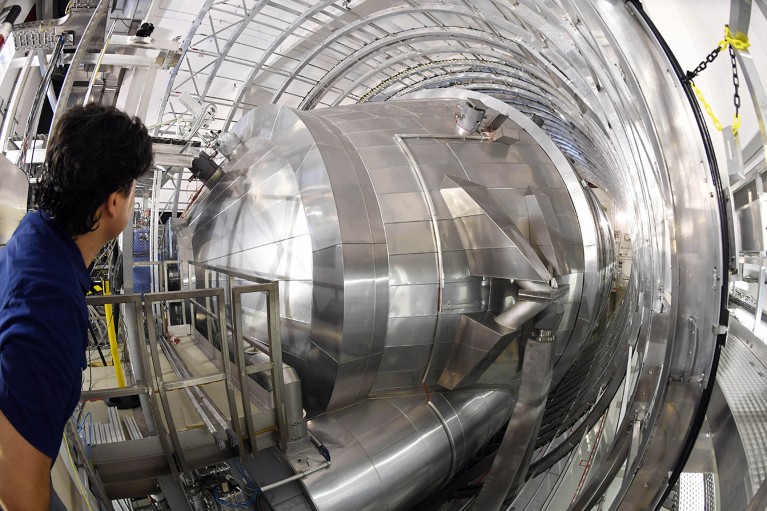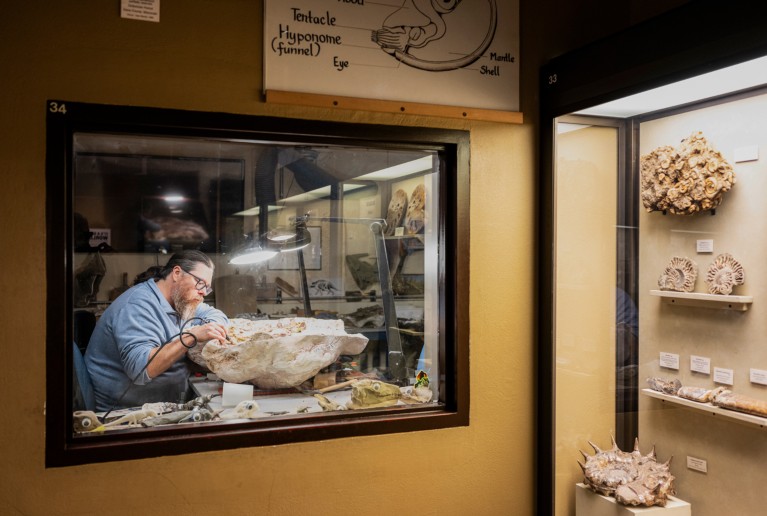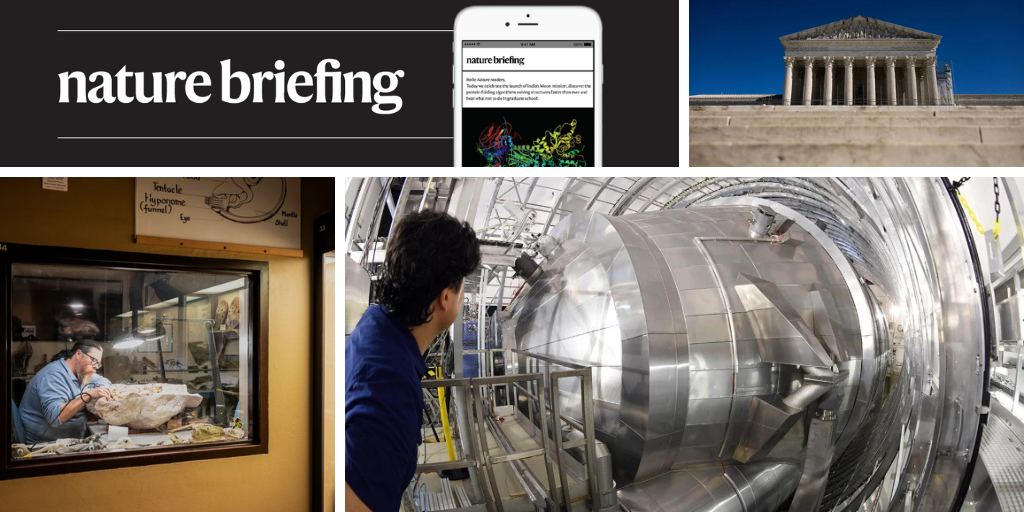You have full access to this article via your institution.
Hello Nature readers, would you like to get this Briefing in your inbox free every day? Sign up here.

The main spectrometer of the Karlsruhe Tritium Neutrino (KATRIN) experiment.Credit: Uli Deck/dpa via Alamy
The most advanced neutrino weigh-in so far has put a new upper limit on the enigmatic particle’s mass, capping it at 0.45 electron volts — less than one-millionth the mass of an electron. Researchers studied 259 days’ worth of data to arrive at the new estimate, which cut the previous best measurement almost in half. Neutrinos are the only elementary particles whose mass is unknown. Measuring it could provide a crucial clue to how the particle acquires its mass in the first place.
Scientists have observed a distant planet plunging into the star it was orbiting, revealing a new way that planets can ‘die’. Physicists first spotted a bright flash from the planet in 2023, which they thought meant it had been engulfed by its host star during end-of-life expansion. When they used the James Webb Space Telescope to take a second look, they found that the star was too early in its life cycle to have started expanding. The team now proposes the planet’s orbit got closer and closer to the star over millions of years, until the two finally collided.
Reference: The Astrophysics Journal paper
Features & opinion
“The Brexit vote, for me, was an end to the certainties provided by the European Union,” says cancer researcher Diana Passaro. “At the time, I was pregnant and felt anxious about not being British.” Five years after the UK’s formal departure from the European Union, Nature asked Passaro and two other European research-group leaders about how the United Kingdom’s departure from the bloc affected their careers, and whether the fears they had in 2020 were realized. “Brexit highlighted the need for scientists to speak out about European Union ideals and more generally on the influence that political decisions can have on science,” says organic chemist Niek Buurma.
In More Everything Forever, science journalist Adam Becker meets the self-proclaimed elders of artificial intelligence to explore the notion of “technological salvation” — the idea that almost any problem can be solved by the application of computer science. Becker’s book, written before the rise to prominence of billionaire businessman Elon Musk in the US government, argues there should be more public debate of techno-utopian ideas. This argument seems to fall on deaf ears with Becker’s interviewees, however. “If only billionaires were involved, debating ideas would be futile — but young scientists might still be open to pragmatism and discussion,” writes computer scientist Jaron Lanier in his review.
Humans and chewing gum — or some form of it anyway — go way back. The Aztecs chewed petroleum-based natural bitumen, and before them, people in Scandinavia were chewing pitch made from the bark of birch trees. Perhaps unsurprisingly, oral hygiene was one of the main reasons people chewed back in the day. It cleaned their teeth and freshened their breath, says anthropologist Jennifer Mathews. But more than that, it probably helped people fend off hunger and thirst when resources were scarce, and could even have sharpened their senses and kept them alert.
Where I work

David Lovelace is a vertebrate palaeontologist at the University of Wisconsin Geology Museum in Madison.Credit: Jeff Miller/University of Wisconsin–Madison
Palaeontologist David Lovelace studies fossils excavated from sites around Wyoming. As many of these sites border the Wind River Reservation, home to two Native American tribes, Lovelace and his team worked with Elders from the community to name the fossils of three new animals discovered on earlier expeditions. “These are now the first species to have scientific names entirely in the Shoshone and Arapaho languages,” he says. “Regardless of where people are in the world, deeper connections in the community are what’s going to push science forwards.” (Nature | 3 min read) (Jeff Miller/University of Wisconsin–Madison)
On Friday, Leif Penguinson was wandering in Muddus, a national park in northern Sweden. Did you find the penguin? When you’re ready, here’s the answer.
Thanks for reading,
Jacob Smith, associate editor, Nature Briefing
Want more? Sign up to our other free Nature Briefing newsletters:
• Nature Briefing: Careers — insights, advice and award-winning journalism to help you optimize your working life
• Nature Briefing: Microbiology — the most abundant living entities on our planet — microorganisms — and the role they play in health, the environment and food systems
• Nature Briefing: Anthropocene — climate change, biodiversity, sustainability and geoengineering
• Nature Briefing: AI & Robotics — 100% written by humans, of course
• Nature Briefing: Cancer — a weekly newsletter written with cancer researchers in mind
• Nature Briefing: Translational Research — covers biotechnology, drug discovery and pharma


